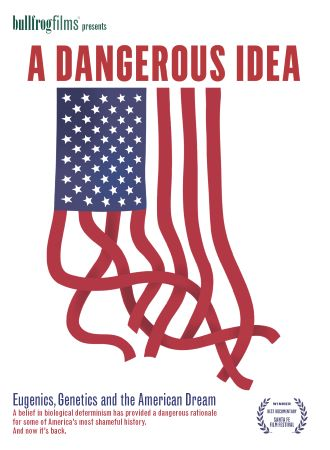
A Dangerous Idea: Eugenics, Genetics, and the American Dream 2018
Distributed by Bullfrog Films, PO Box 149, Oley, PA 19547; 800-543-FROG (3764)
Produced by Paragon Media
Directed by Stephanie Welch
DVD, color, 106 mins
College - General Adult
American History; Bioethics; Ethics; Eugenics; Genetics
Date Entered: 10/30/2019
Reviewed by Michael J. Coffta, Business Librarian, Bloomsburg University of PennsylvaniaWith great progress in gene therapy, the notions of gene manipulation in popular culture hold that there is a “winner’s” gene, a “rage” gene, a “promiscuity” gene, a “gay” gene, and so on. Scientific support of genes determining cognitive and behavioral traits, however, has profound implications. Are these instances of scientific discovery driving political beliefs, or is it political directives that compel science to find genetic evidence to support them? Institutions have used centuries-old presumptions based on biology (race, sex, etc.) to further their respective causes. Now, these institutions are pointing to scientific evidence. Further, prominent figures such as Nobel Laureate James Watson and Lawrence Summers, Harvard University President (2005), have cited biological bases for psychological and physical characteristics of groups of people. Interest groups and outraged individuals in general have fought back calling it “junk science.” The opposition is doubtful about being able to control or predict certain gene outcomes, citing the perennial “nurture vs. nature” discussion. If gene therapy is true science, then one should be able to observe an infant’s genes, after years to learn if the predictions were true. This opposition concludes that if race, etc. are not based in biology, then politics, economics, etc. are indeed responsible for inequalities.
In addition to examining the identification of specific genes and the moral implications thereof, the film explores the consequences of gene augmentation. That is, once a gene matching a certain characteristic is identified and mapped, it is feasible that the gene could either be “corrected” or augmented. This seems like a wonderful innovation at first glance: having the ability to identify and treat a “cancer” gene. What if a gene therapy is discovered to raise children’s IQ scores by 15%? Who may buy it? Who sells it or provides it? The film also takes a troubling look at corporate ventures into gene therapy. Will only the wealthy be able to take advantage of such a clear advantage for their children?
True to its title, the film then evaluates the notions of eugenics and racial divisions throughout US history. The film makers offer chilling examples of state-operated sterilization. Powerfully and without reservation, one interviewee states that the things done in the United States in the name of eugenics and the Jim Crow Laws “would have educated Hitler.” The film concludes by questioning the American dream, and how/if people can have an equal opportunity for the “pursuit of happiness” if science-based labeling is instituted.
“Provocative” does not begin to describe this unsettling work. This documentary will force one’s ethical standing out of one’s comfort zone and into a crucible. It continuously requires the audience to weigh the moral value of a proposition, and then takes those suppositions to their practical extensions. In other words, asking, “If you take that statement as true, what then follows?” It examines sophisticated scientific concepts without a great deal of jargon. This work will serve as an outstanding starting point to engage students in lively debate, as well as serve as an extensive information piece for the fundamentals and near-term future of genetic research.
Awards:
Santa Fe Film Festival – Best Documentary